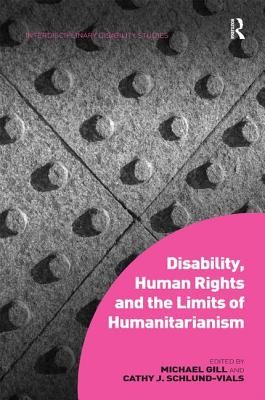
- We will send in 10–14 business days.
- Author: Michael Gill
- Publisher: Routledge
- ISBN-10: 1472420918
- ISBN-13: 9781472420916
- Format: 15.6 x 23.4 x 1.6 cm, hardcover
- Language: English
- SAVE -10% with code: EXTRA
Disability, Human Rights and the Limits of Humanitarianism. Edited by Michael Gill, Cathy J. Schlund-Vials (e-book) (used book) | bookbook.eu
Reviews
Description
Disability studies scholars and activists have long criticized and critiqued so-termed 'charitable' approaches to disability where the capitalization of individual disabled bodies to invoke pity are historically, socially, and politically circumscribed by paternalism. Disabled individuals have long advocated for civil and human rights in various locations throughout the globe, yet contemporary human rights discourses problematically co-opt disabled bodies as 'evidence' of harms done under capitalism, war, and other forms of conflict, while humanitarian non-governmental organizations often use disabled bodies to generate resources for their humanitarian projects. It is the connection between civil rights and human rights, and this concomitant relationship between national and global, which foregrounds this groundbreaking book's contention that disability studies productively challenge such human rights paradigms, which troublingly eschew disability rights in favor of exclusionary humanitarianism. It relocates disability from the margins to the center of academic and activist debates over the vexed relationship between human rights and humanitarianism. These considerations thus productively destabilize able-bodied assumptions that undergird definitions of personhood in civil rights and human rights by highlighting intersections between disability, race, gender ethnicity, and sexuality as a way to interrogate the possibilities (and limitations) of human rights as a politicized regime.
EXTRA 10 % discount with code: EXTRA
The promotion ends in 18d.17:50:53
The discount code is valid when purchasing from 10 €. Discounts do not stack.
- Author: Michael Gill
- Publisher: Routledge
- ISBN-10: 1472420918
- ISBN-13: 9781472420916
- Format: 15.6 x 23.4 x 1.6 cm, hardcover
- Language: English English
Disability studies scholars and activists have long criticized and critiqued so-termed 'charitable' approaches to disability where the capitalization of individual disabled bodies to invoke pity are historically, socially, and politically circumscribed by paternalism. Disabled individuals have long advocated for civil and human rights in various locations throughout the globe, yet contemporary human rights discourses problematically co-opt disabled bodies as 'evidence' of harms done under capitalism, war, and other forms of conflict, while humanitarian non-governmental organizations often use disabled bodies to generate resources for their humanitarian projects. It is the connection between civil rights and human rights, and this concomitant relationship between national and global, which foregrounds this groundbreaking book's contention that disability studies productively challenge such human rights paradigms, which troublingly eschew disability rights in favor of exclusionary humanitarianism. It relocates disability from the margins to the center of academic and activist debates over the vexed relationship between human rights and humanitarianism. These considerations thus productively destabilize able-bodied assumptions that undergird definitions of personhood in civil rights and human rights by highlighting intersections between disability, race, gender ethnicity, and sexuality as a way to interrogate the possibilities (and limitations) of human rights as a politicized regime.


Reviews